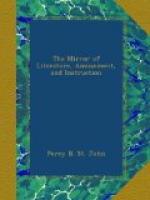M.L.B
* * * * *
Manners & Customs of all Nations.
* * * * *
SINGULAR TENURE.
Among the records in the Tower of London, is one to the following effect:—King John gave several lands at Kipperton and Alterton, in Kent, to Solomon Atlefield to be held by this service:—“That as often as the King should please to cross the sea, the said Solomon or his heirs, should be obliged to go with him, to hold his majesty’s head if there be occasion for it;” that is, should his majesty be sea-sick. And it appears by the record, that this same office of head-holding was accordingly performed afterwards, in the reign of Edward the First.
R.S.
* * * * *
BOROUGH-ENGLISH.
(For the Mirror.)
The custom of the manor of Woodford, Essex, is Borough-English, by which the youngest son inherits.
The origin of this custom has been a subject of much dispute; but it appears to have prevailed greatly among the East Saxons. Dr. Plot conjectured, that it was introduced by the lord of the manor’s claiming the right of enjoying the bride, daughter of his tenant, on the wedding-night; therefore the villain or slave, doubting whether the eldest son was his own, made the youngest his heir. This custom prevailed among the Ancient Britons before there were either Saxons or villains.
By the laws of succession among the Ancient Britons, a man’s land at his death did not descend to his eldest son, but was equally divided among all his sons; and when any dispute arose, it was determined by the Druids. The youngest son, it appears, was more favoured than the eldest or any of his brothers. “When the brothers have divided their father’s estate, the youngest shall have the best house, with all the office-houses, the implements of husbandry, his father’s kettle, his axe for cutting wood, and his knife. These three last things the father cannot give away by gift, nor leave by his last will to any but his youngest son, and if they are pledged they shall be redeemed.”
To account for this law is not very difficult. The elder brothers of a family were supposed to have left their father’s house before his death, and obtained a house and necessaries of their own; but the youngest, by reason of his tender age, was considered as more helpless, and not so well provided. Halbert H.
* * * * *




